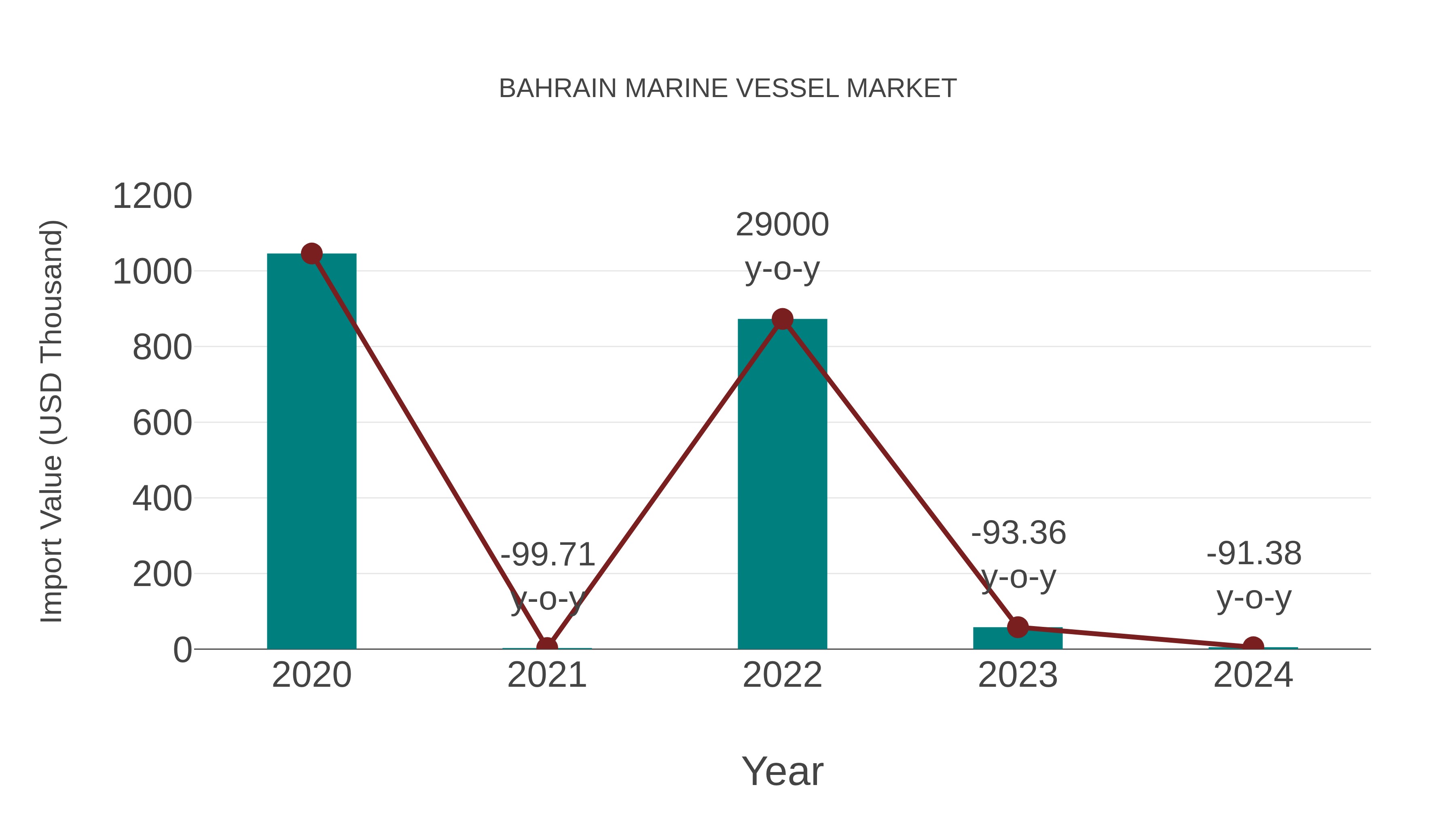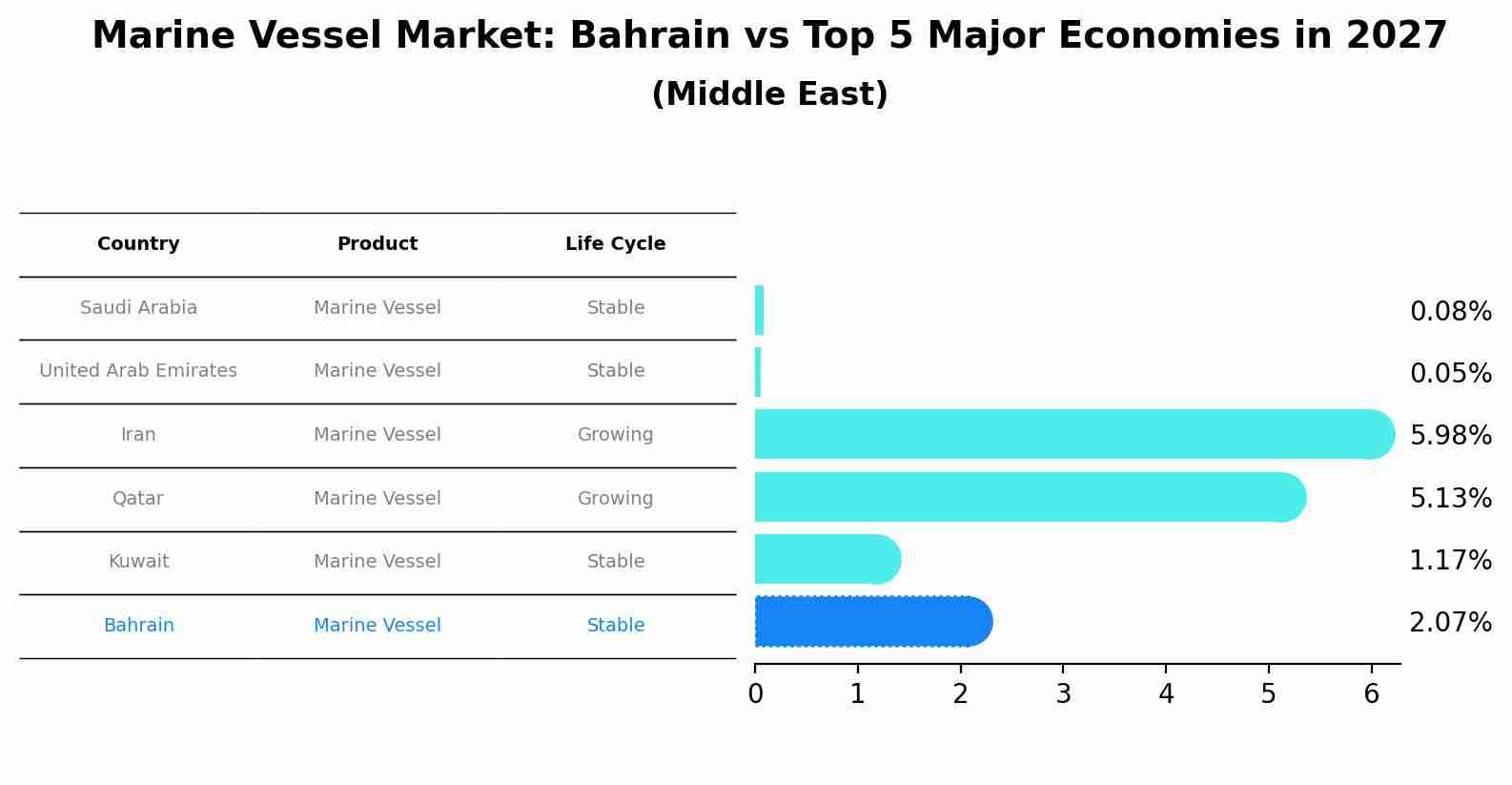Bahrain Marine Vessel Market (2025-2031) Outlook | Analysis, Revenue, Size, Forecast, Value, Growth, Share, Industry, Companies & Trends
| Product Code: ETC383024 | Publication Date: Aug 2022 | Updated Date: Jan 2026 | Product Type: Market Research Report | |
| Publisher: 6Wresearch | Author: Dhaval Chaurasia | No. of Pages: 75 | No. of Figures: 35 | No. of Tables: 20 |
Bahrain Marine Vessel Market: Import Trend Analysis
Bahrain import trend for the marine vessel market experienced a significant decline from 2023 to 2024, with a growth rate of -91.38%. The compound annual growth rate (CAGR) for the period of 2020-2024 stood at -73.71%. This sharp downturn can be attributed to shifts in demand dynamics or potential changes in trade policies impacting the market`s stability.

Marine Vessel Market: Bahrain vs Top 5 Major Economies in 2027 (Middle East)
Bahrain's Marine Vessel market is anticipated to experience a stable growth rate of 2.07% by 2027, reflecting trends observed in the largest economy Saudi Arabia, followed by United Arab Emirates, Iran, Qatar and Kuwait.

Bahrain Marine Vessel Market Synopsis
Bahrains marine vessel market plays a critical role in supporting its maritime economy, including fishing, logistics, naval defense, and recreational boating. The countrys coastal geography necessitates a constant demand for fishing boats, ferries, patrol vessels, and yachts. The market is influenced by tourism development, port infrastructure upgrades, and regional trade dynamics. Both new builds and maintenance services are in demand, with a mix of imported vessels and local shipyard operations.
Trends of the market
Bahrains marine vessel market is influenced by its strategic location and active shipping, fishing, and naval sectors. Demand is driven by commercial shipping, offshore oil operations, and coastal tourism. With continued investment in port infrastructure and maritime safety, the market is expected to grow steadily, especially in small and medium vessel segments.
Challenges of the market
The marine vessel market in Bahrain faces stiff competition from regional shipping hubs like Dubai and Oman, which offer better infrastructure and incentives. High operational costs and limited shipbuilding capabilities locally make the country heavily dependent on imports for commercial and recreational vessels. Maintenance facilities and skilled marine engineering labor are in short supply, slowing down after-sales services. Environmental regulations on emissions and waste disposal are becoming stricter, adding compliance burdens to vessel operators. Political uncertainties and maritime security risks in the region can further disrupt business confidence. These issues collectively hamper sustainable growth in the sector.
Investment opportunities in the Market
Bahrains strategic location along the Persian Gulf and its focus on maritime trade and naval development present strong opportunities in the marine vessel market. With plans to expand ports and bolster defense capabilities, demand for cargo ships, patrol boats, and leisure vessels is on the rise. Investors can look into supplying vessels, parts, and maintenance services or forming joint ventures with global shipbuilders. The rise in marine tourism and fishing activities also supports the need for small and mid-sized boats. Bahrains favorable trade environment and free zones make it attractive for manufacturing and assembling marine vessels for regional distribution. Investment in green and automated vessels could align with sustainability goals and technological modernization.
Government Policy of the market
The government of Bahrain regulates the use of malt extracts in animal feed through policies that ensure product safety and nutritional value. The Ministry of Municipalities and Urban Planning sets standards for animal feed ingredients, including malt extracts, to ensure they meet health and safety requirements. Regulations also govern the labeling and nutritional content of animal feed products, ensuring transparency and consumer confidence. Bahrain promotes the use of locally sourced ingredients in animal feed production, supporting both sustainability and food security. Policies also encourage research into alternative, more sustainable feed ingredients to support the long-term growth of the livestock industry.
Key Highlights of the Report:
- Bahrain Marine Vessel Market Outlook
- Market Size of Bahrain Marine Vessel Market, 2024
- Forecast of Bahrain Marine Vessel Market, 2031
- Historical Data and Forecast of Bahrain Marine Vessel Revenues & Volume for the Period 2021 - 2031
- Bahrain Marine Vessel Market Trend Evolution
- Bahrain Marine Vessel Market Drivers and Challenges
- Bahrain Marine Vessel Price Trends
- Bahrain Marine Vessel Porter's Five Forces
- Bahrain Marine Vessel Industry Life Cycle
- Historical Data and Forecast of Bahrain Marine Vessel Market Revenues & Volume By Type for the Period 2021 - 2031
- Historical Data and Forecast of Bahrain Marine Vessel Market Revenues & Volume By Commercial Vessel for the Period 2021 - 2031
- Historical Data and Forecast of Bahrain Marine Vessel Market Revenues & Volume By Passenger Ship for the Period 2021 - 2031
- Historical Data and Forecast of Bahrain Marine Vessel Market Revenues & Volume By LNG/LPG Carrier for the Period 2021 - 2031
- Historical Data and Forecast of Bahrain Marine Vessel Market Revenues & Volume By Special Purpose Vessel for the Period 2021 - 2031
- Historical Data and Forecast of Bahrain Marine Vessel Market Revenues & Volume By System for the Period 2021 - 2031
- Historical Data and Forecast of Bahrain Marine Vessel Market Revenues & Volume By Marine Engine for the Period 2021 - 2031
- Historical Data and Forecast of Bahrain Marine Vessel Market Revenues & Volume By Sensor System for the Period 2021 - 2031
- Historical Data and Forecast of Bahrain Marine Vessel Market Revenues & Volume By Control System for the Period 2021 - 2031
- Historical Data and Forecast of Bahrain Marine Vessel Market Revenues & Volume By Electrical System for the Period 2021 - 2031
- Historical Data and Forecast of Bahrain Marine Vessel Market Revenues & Volume By Auxiliary System for the Period 2021 - 2031
- Historical Data and Forecast of Bahrain Marine Vessel Market Revenues & Volume By Communication System for the Period 2021 - 2031
- Historical Data and Forecast of Bahrain Marine Vessel Market Revenues & Volume By End-use for the Period 2021 - 2031
- Historical Data and Forecast of Bahrain Marine Vessel Market Revenues & Volume By Original Equipment Manufacturer (OEM) for the Period 2021 - 2031
- Historical Data and Forecast of Bahrain Marine Vessel Market Revenues & Volume By Aftermarket for the Period 2021 - 2031
- Bahrain Marine Vessel Import Export Trade Statistics
- Market Opportunity Assessment By Type
- Market Opportunity Assessment By System
- Market Opportunity Assessment By End-use
- Bahrain Marine Vessel Top Companies Market Share
- Bahrain Marine Vessel Competitive Benchmarking By Technical and Operational Parameters
- Bahrain Marine Vessel Company Profiles
- Bahrain Marine Vessel Key Strategic Recommendations
Frequently Asked Questions About the Market Study (FAQs):
Export potential assessment - trade Analytics for 2030
Export potential enables firms to identify high-growth global markets with greater confidence by combining advanced trade intelligence with a structured quantitative methodology. The framework analyzes emerging demand trends and country-level import patterns while integrating macroeconomic and trade datasets such as GDP and population forecasts, bilateral import–export flows, tariff structures, elasticity differentials between developed and developing economies, geographic distance, and import demand projections. Using weighted trade values from 2020–2024 as the base period to project country-to-country export potential for 2030, these inputs are operationalized through calculated drivers such as gravity model parameters, tariff impact factors, and projected GDP per-capita growth. Through an analysis of hidden potentials, demand hotspots, and market conditions that are most favorable to success, this method enables firms to focus on target countries, maximize returns, and global expansion with data, backed by accuracy.
By factoring in the projected importer demand gap that is currently unmet and could be potential opportunity, it identifies the potential for the Exporter (Country) among 190 countries, against the general trade analysis, which identifies the biggest importer or exporter.
To discover high-growth global markets and optimize your business strategy:
Click Here- Single User License$ 1,995
- Department License$ 2,400
- Site License$ 3,120
- Global License$ 3,795
Search
Thought Leadership and Analyst Meet
Our Clients
Related Reports
- Saudi Arabia Car Window Tinting Film, Paint Protection Film (PPF), and Ceramic Coating Market (2025-2031) | Strategy, Consumer Insights, Analysis, Investment Trends, Opportunities, Growth, Size, Share, Industry, Revenue, Segments, Value, Segmentation, Supply, Forecast, Restraints, Outlook, Competition, Drivers, Trends, Demand, Pricing Analysis, Competitive, Strategic Insights, Companies, Challenges
- South Africa Stationery Market (2025-2031) | Share, Size, Industry, Value, Growth, Revenue, Analysis, Trends, Segmentation & Outlook
- Afghanistan Rocking Chairs And Adirondack Chairs Market (2026-2032) | Size & Revenue, Competitive Landscape, Share, Segmentation, Industry, Value, Outlook, Analysis, Trends, Growth, Forecast, Companies
- Afghanistan Apparel Market (2026-2032) | Growth, Outlook, Industry, Segmentation, Forecast, Size, Companies, Trends, Value, Share, Analysis & Revenue
- Canada Oil and Gas Market (2026-2032) | Share, Segmentation, Value, Industry, Trends, Forecast, Analysis, Size & Revenue, Growth, Competitive Landscape, Outlook, Companies
- Germany Breakfast Food Market (2026-2032) | Industry, Share, Growth, Size, Companies, Value, Analysis, Revenue, Trends, Forecast & Outlook
- Australia Briquette Market (2025-2031) | Growth, Size, Revenue, Forecast, Analysis, Trends, Value, Share, Industry & Companies
- Vietnam System Integrator Market (2026-2032) | Size, Companies, Analysis, Industry, Value, Forecast, Growth, Trends, Revenue & Share
- ASEAN and Thailand Brain Health Supplements Market (2025-2031) | Strategy, Consumer Insights, Analysis, Investment Trends, Opportunities, Growth, Size, Share, Industry, Revenue, Segments, Value, Segmentation, Supply, Forecast, Restraints, Outlook, Competition, Drivers, Trends, Demand, Pricing Analysis, Competitive, Strategic Insights, Companies, Challenges
- ASEAN Bearings Market (2025-2031) | Strategy, Consumer Insights, Analysis, Investment Trends, Opportunities, Growth, Size, Share, Industry, Revenue, Segments, Value, Segmentation, Supply, Forecast, Restraints, Outlook, Competition, Drivers, Trends, Demand, Pricing Analysis, Competitive, Strategic Insights, Companies, Challenges
Industry Events and Analyst Meet
Whitepaper
- Middle East & Africa Commercial Security Market Click here to view more.
- Middle East & Africa Fire Safety Systems & Equipment Market Click here to view more.
- GCC Drone Market Click here to view more.
- Middle East Lighting Fixture Market Click here to view more.
- GCC Physical & Perimeter Security Market Click here to view more.
6WResearch In News
- Doha a strategic location for EV manufacturing hub: IPA Qatar
- Demand for luxury TVs surging in the GCC, says Samsung
- Empowering Growth: The Thriving Journey of Bangladesh’s Cable Industry
- Demand for luxury TVs surging in the GCC, says Samsung
- Video call with a traditional healer? Once unthinkable, it’s now common in South Africa
- Intelligent Buildings To Smooth GCC’s Path To Net Zero


















